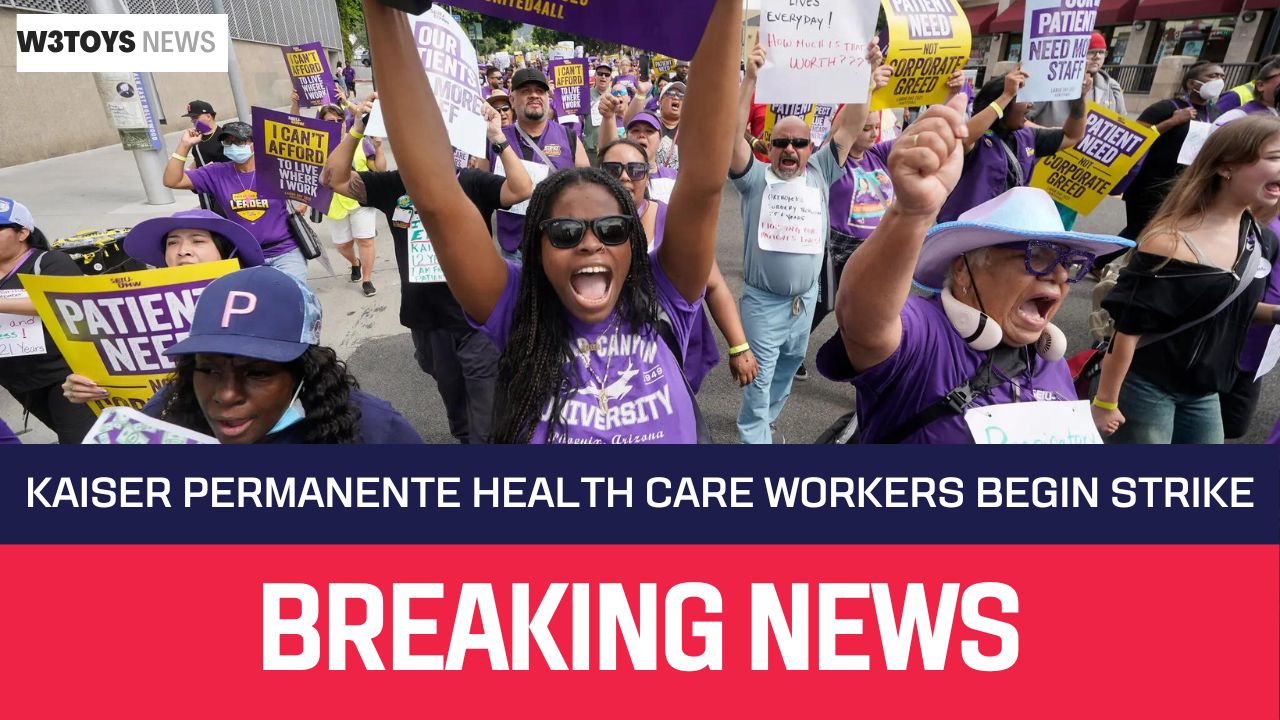More than 75,000 workers at Kaiser Permanente, one of the largest healthcare providers in the United States, have begun a nationwide strike. The strike began on Wednesday morning when unionized employees of the not-for-profit health provider walked off the job. The strike has been called after contract talks stalled on Tuesday, leaving both parties without an agreement.
The strike is set to affect Kaiser Permanente hospitals in California, Virginia, Oregon, Maryland, and the District of Columbia. The healthcare workers are demanding better pay, improved benefits, and increased staffing levels. The strike could potentially disrupt healthcare services in the affected areas, with some patients having to reschedule appointments or seek care elsewhere. Kaiser Permanente has stated that it has contingency plans in place to ensure that patient care is not disrupted during the strike.
Background of Kaiser Permanente
Kaiser Permanente is one of the largest not-for-profit healthcare providers in the United States. It was founded in 1945 in Oakland, California, by industrialist Henry J. Kaiser and physician Sidney Garfield. The organization started as a prepaid health plan for construction workers who were building ships for the U.S. government during World War II.
Today, Kaiser Permanente serves over 12 million members across eight states and the District of Columbia. It operates 39 hospitals and more than 700 medical offices and clinics. The organization employs more than 217,000 people, including physicians, nurses, and other healthcare workers.
Kaiser Permanente is known for its integrated healthcare model, which combines health insurance with medical care. Members pay a monthly premium for coverage and receive healthcare services through Kaiser Permanente’s network of providers. The organization also invests heavily in preventive care and wellness programs to help members stay healthy and avoid costly medical treatments.
Despite its reputation for high-quality care, Kaiser Permanente has faced criticism in recent years over issues such as understaffing and long wait times for appointments. These concerns have led to calls for increased investment in healthcare staffing and infrastructure, as well as greater transparency and accountability from the organization.
Reasons for the Strike
Kaiser Permanente health care workers and support staff in six states and Washington, D.C. are demanding better pay and more robust staffing. The coalition of unions allege that the company has been engaging in unfair labor practices. The strike involves more than 75,000 workers at one of the nation’s largest health care providers.
According to the unions, the workers have been negotiating with Kaiser Permanente for months, but the company has refused to address their concerns. The workers claim that they are overworked and understaffed, which is affecting the quality of care they can provide to patients. They are also demanding wage increases and better benefits.
The workers are represented by the Coalition of Kaiser Permanente Unions, which is made up of 11 unions. The coalition has accused Kaiser Permanente of putting profits before patients and workers. They claim that the company has been cutting costs by reducing staffing levels and increasing workloads, which has resulted in burnout and turnover among workers.
The unions have also accused Kaiser Permanente of violating labor laws by interfering with union activities and intimidating workers who support the strike. The National Labor Relations Board has issued several complaints against the company, including allegations of unfair labor practices.
In response, Kaiser Permanente has argued that the unions are being unreasonable in their demands. The company has said that it is committed to bargaining in good faith and reaching a fair agreement with the workers. However, it has also stated that it has contingency plans in place to ensure that patient care is not disrupted during the strike.
Impact on Health Care Services
Patient Care
As more than 75,000 Kaiser Permanente healthcare workers went on strike from Oct. 4 to Oct. 7, patients across six states and Washington D.C. could face disruptions in their care. The three-day strike would hit hospitals, clinics, and medical offices from California and Colorado to Washington D.C. Patients scheduled for elective procedures or appointments may experience delays or cancellations. The Coalition of Kaiser Permanente Unions has assured that emergency services will not be affected.
Kaiser Permanente has implemented contingency plans to minimize the impact on patient care and ensure that essential services are available. The healthcare provider has rescheduled non-urgent appointments and procedures, redirected patients to other facilities, and brought in temporary staff to fill in for striking workers. The company has also urged patients to use its telehealth services, which provide virtual consultations with doctors and nurses.
Operational Challenges
The strike has also caused operational challenges for Kaiser Permanente. The healthcare provider has faced staffing shortages, which have led to longer wait times and increased workloads for remaining workers. The company has had to rely on temporary staff, which can be costly and may not have the same level of experience as regular employees.
The Coalition of Kaiser Permanente Unions has demanded better pay and more robust staffing, among other issues. The union has accused the company of unfair labor practices, including outsourcing jobs and cutting benefits. Kaiser Permanente has denied the allegations and stated that it values its employees and is committed to bargaining in good faith.
In conclusion, the Kaiser Permanente healthcare workers’ strike has had a significant impact on patient care and operational efficiency. While the healthcare provider has implemented contingency plans to minimize the disruption, patients may still face delays or cancellations. The strike highlights the ongoing tension between healthcare workers and employers over issues such as pay, benefits, and staffing.
Responses from Kaiser Permanente
Kaiser Permanente has released a statement regarding the strike initiated by its workers. The statement acknowledges the workers’ right to strike but emphasizes that the action is unnecessary and will only harm patients and their families.
The statement also points out that the strike will not affect the quality of care provided by Kaiser Permanente. The organization has contingency plans in place to ensure that patients continue to receive the care they need. The statement assures patients that they can still access Kaiser Permanente’s hospitals, clinics, and medical offices during the strike.
Kaiser Permanente has also expressed disappointment in the union’s decision to strike. The organization had been negotiating with the union for months and had made significant progress in addressing the workers’ concerns. Kaiser Permanente had offered a 3% wage increase and additional benefits, including a $2,000 bonus for each employee.
The statement highlights that the strike will only disrupt the progress made in negotiations and delay the resolution of outstanding issues. Kaiser Permanente urges the union to return to the bargaining table and continue to work towards a mutually beneficial agreement.
Overall, Kaiser Permanente’s response to the strike is confident and neutral. The organization acknowledges the workers’ concerns but emphasizes that the strike is unnecessary and will only harm patients and their families. The statement also highlights the contingency plans in place to ensure that patients continue to receive the care they need.
Views of Health Care Workers
Kaiser Permanente health care workers are striking to demand better pay and more robust staffing. More than 75,000 workers across six states and Washington, D.C., are participating in the strike, making it the largest health care worker strike in U.S. history.
According to the workers, Kaiser Permanente has not invested in its workforce, leading to understaffing and low morale. They argue that the nonprofit organization is more focused on profits than on providing quality care to patients.
The workers are seeking a 4% annual wage increase, as well as increased staffing levels to ensure that patients receive the care they need. They also want to protect their benefits and pensions, which they say are under threat.
Kaiser Permanente, on the other hand, argues that it has offered a fair contract to the workers and that the strike is unnecessary. The organization says that it has invested heavily in its workforce and that it is committed to providing quality care to patients.
Despite these competing views, the strike is expected to continue for three days. The outcome remains uncertain, but it is clear that the workers are determined to make their voices heard and to fight for better working conditions and patient care.
Public Reaction
The strike by Kaiser Permanente health care workers has garnered significant attention from the public, with many expressing support for the workers’ demands for better pay and staffing levels.
Social media has been a particularly popular platform for discussion, with the hashtag #KaiserStrike trending on Twitter. Many users have shared stories of their own experiences with the health care provider, both positive and negative, and have expressed solidarity with the striking workers.
Some members of the public have also expressed concern about the impact of the strike on patient care. However, the Coalition of Kaiser Permanente Unions has emphasized that patient care will not be compromised during the strike, with emergency and urgent care services continuing to operate as usual.
In addition to public support, the striking workers have also received backing from political figures, including several members of Congress. Senator Bernie Sanders tweeted his support for the workers, stating that “health care workers deserve fair wages and safe working conditions.”
Overall, the public reaction to the Kaiser Permanente health care workers’ strike has been largely supportive, with many expressing solidarity with the workers and their demands for better pay and staffing levels.
Potential Resolutions
As the Kaiser Permanente health care workers strike continues, both sides are looking for potential resolutions to the ongoing dispute. Here are some of the possible outcomes that could bring an end to the strike:
Negotiated Agreement
The most obvious solution to the strike is for Kaiser Permanente and the Coalition of Kaiser Permanente Unions to come to a negotiated agreement. The two sides have been in talks for months, but have yet to reach a deal. However, with the strike in full swing, there may be added pressure for both sides to reach a compromise.
A negotiated agreement could involve a variety of concessions from both sides, including changes to staffing levels, pay increases, and improved benefits. If a deal is reached, it would likely be put to a vote by union members before being implemented.
Arbitration
If negotiations fail, another potential solution is for the two sides to enter into binding arbitration. In this scenario, an independent third party would be brought in to hear both sides of the dispute and make a final decision on the issues at hand.
While arbitration can be costly and time-consuming, it can also be an effective way to resolve disputes when negotiations have stalled. However, both sides would need to agree to enter into arbitration, and there is no guarantee that the decision would be favorable to either side.
Government Intervention
Finally, if all else fails, government intervention may be necessary to bring an end to the strike. This could involve state or federal lawmakers stepping in to mediate the dispute, or even passing legislation that would force the two sides to come to an agreement.
However, government intervention is often seen as a last resort, as it can be difficult to find a solution that satisfies both sides. Additionally, lawmakers may be hesitant to get involved in a labor dispute that could have far-reaching consequences for the health care industry as a whole.
Long Term Implications
The Kaiser Permanente health care workers’ strike could have significant long-term implications for both the company and the workers. Here are a few potential outcomes:
- Financial impact on Kaiser Permanente: The strike could have a significant financial impact on Kaiser Permanente. The company may lose revenue due to canceled appointments and procedures, and it may also have to pay for temporary replacement workers. If the strike lasts for an extended period, it could also damage the company’s reputation and lead to a loss of patients.
- Impact on patient care: The strike could also have an impact on patient care. With thousands of workers on strike, there may be delays in appointments and procedures, and patients may have to wait longer to receive care. The temporary replacement workers may not be as experienced as the striking workers, which could lead to lower-quality care.
- Impact on the labor movement: The Kaiser Permanente strike is part of a larger trend of labor unrest in the United States. If the workers are successful in their demands, it could inspire other workers to organize and demand better pay and working conditions. On the other hand, if the strike is unsuccessful, it could weaken the labor movement and discourage workers from organizing.
- Potential for future strikes: If the workers are unsuccessful in their demands, they may choose to go on strike again in the future. This could lead to more disruptions in patient care and further financial losses for Kaiser Permanente. On the other hand, if the workers are successful, it could set a precedent for other health care workers to demand better pay and working conditions.
Overall, the long-term implications of the Kaiser Permanente health care workers’ strike are uncertain. It remains to be seen whether the workers will be successful in their demands and what impact the strike will have on patient care and the labor movement.
Conclusion
The Kaiser Permanente health care workers’ strike is set to become the largest in U.S. history, with over 75,000 employees planning to participate in the four-day strike. The workers are demanding better pay and more robust staffing, and if a deal is not reached, the strike will begin on Wednesday morning.
The strike is a significant event that highlights the ongoing struggles of health care workers across the country. It also underscores the importance of fair wages and working conditions for these essential workers who have been on the front lines of the COVID-19 pandemic.
Kaiser Permanente is one of the nation’s largest not-for-profit health providers, and the strike will undoubtedly have a significant impact on the organization’s operations. The workers’ demands are reasonable, and it is essential that Kaiser Permanente negotiates in good faith to find a resolution that benefits both the workers and the organization.
Overall, the Kaiser Permanente health care workers’ strike is a reminder of the importance of valuing and supporting essential workers in our society. It is essential that we continue to advocate for fair wages and working conditions for all workers, particularly those who have been on the front lines during the pandemic.
Frequently Asked Questions
What are the reasons for the Kaiser Permanente health care workers’ strike?
More than 75,000 Kaiser Permanente health care workers and support staff in six states and Washington, D.C. are on strike due to better pay and more robust staffing. The workers are also demanding the health care provider to address the staffing shortage that has intensified since the start of the COVID-19 pandemic.
What is the duration of the Kaiser Permanente health care workers’ strike?
The Kaiser Permanente health care workers’ strike started on October 4 and will last for three days until October 6.
How many health care workers are involved in the Kaiser Permanente strike?
Over 75,000 health care workers and support staff in six states and Washington, D.C. are participating in the strike.
What is the impact of the Kaiser Permanente health care workers’ strike on patient care?
The strike is expected to disrupt patient care at hundreds of Kaiser Permanente hospitals and medical facilities across the United States. However, the health care provider has stated that it has contingency plans in place to ensure patient care is not compromised.
Has Kaiser Permanente made any efforts to resolve the strike?
Kaiser Permanente has been in negotiations with the unions representing the striking workers since September, but the two sides have been unable to reach an agreement.
What is the response of the Kaiser Permanente management to the strike?
Kaiser Permanente has stated that it is disappointed that the unions representing the striking workers have chosen to strike. The health care provider has also stated that it is committed to bargaining in good faith and reaching a fair agreement with the striking workers.







